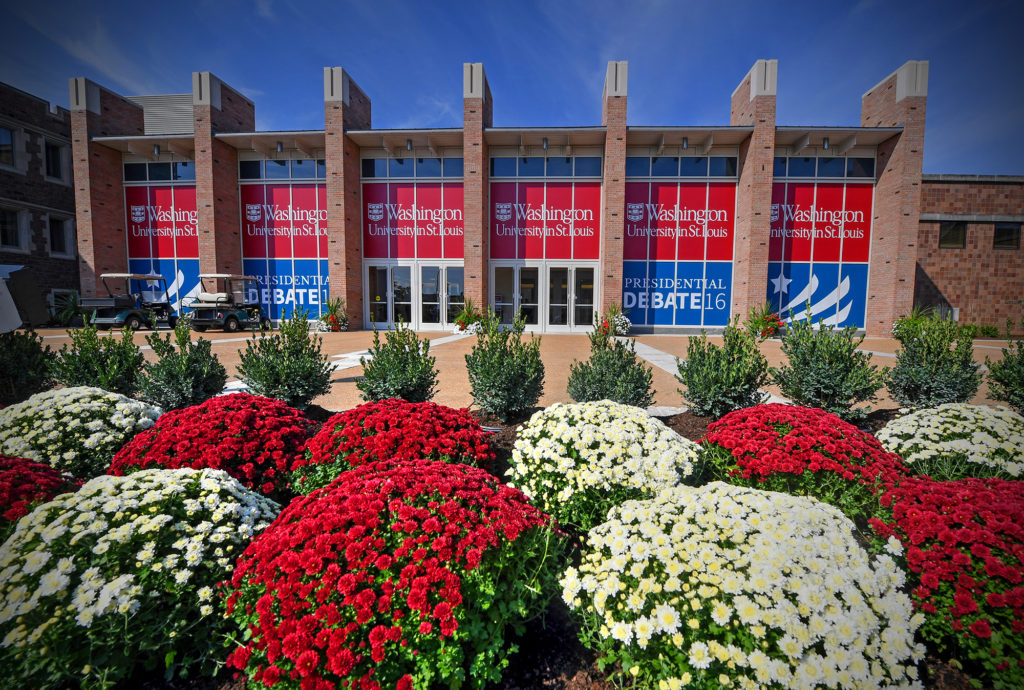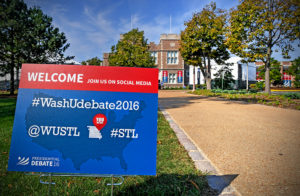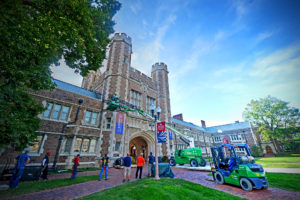
This Sunday, Oct. 9, Washington University in St. Louis will host the second presidential debate. Democratic nominee Hillary Clinton and Republican nominee Donald Trump are the stars of the show, but a supporting cast of more than 4,500 journalists, student volunteers, local police officers, vendors, student audience members, campaign staff, surrogates and university employees also play important roles in this historic event.
“We’re ready,” Chancellor Mark S. Wrighton said. “You can feel the buzz on campus. The students are excited; we’re excited. We’ve been here before, but the thrill never goes away.”
When an expected 80 million viewers — maybe more — tune in to the debate, they will see spangled banners, blooming flowers and Brookings Hall bathed in red, white and blue lights.

But what they won’t see is Craig Hager help a road-wary debate official log onto the Wi-Fi. Or Andrew Koch transform a yoga space in the Sumers Recreation Center into a campaign office. Or Alan Kuebler, associate vice chancellor for resource management, secure sandbags for Facebook.
“When I got the call, I thought, ‘What in the world is flooding?’” Kuebler said. “Well, Facebook needed weights to stabilize their lighting equipment. So they got their sandbags. It doesn’t matter how big, small or strange the request is — you get it done.”
That can-do attitude is why Washington University has hosted more debates than any other university in the nation. It all started in 1992, when the university had one week to stage the presidential debate with Bill Clinton, George H.W. Bush and Ross Perot. The Commission on Presidential Debates (CPD) tapped Washington University again in 2000 and in 2004 as a presidential debate site, and in 2008 for the vice presidential debate.
“One of the reasons we are back for the fifth time is that the response is always the same, which is, ‘We’ll take care of it.’”
-the CPD's Peter Eyre
“One of the reasons we are back for the fifth time is that the response is always the same, which is, ‘We’ll take care of it,’” said Peter Eyre of the CPD. “The school has done a great job getting ready for what will be a very, very significant event. The media interest is off the charts, and so there is a lot pressure on everyone. And the school is doing its usual A+ work.”
Steve Givens, associate vice chancellor and chair of the Presidential Debate Steering Committee, has worked them all. Experience has taught him to be prepared for anything.
“We are not only on top of the details of our plans, we are there to help everyone else execute the details of their plans,” Givens said. “In a lot of ways, we are like a hotel concierge.”
Literally. Givens remembers having to secure a bed in the Athletic Complex for a sleep-deprived moderator. And then there was the time Laura Bush needed an iron the night of the 2004 debate.

James Byard/Washington University)
“It was close to airtime and the facility was locked down,” Kuebler said. “So the Knight Center ran one over, threw it over the fence and we ran it back.”
Washington University’s 235 student volunteers also are ready to serve in ways big and small.
“We’ve got a crew of people who are willing to say ‘yes,’” said Jennie Marchal, associate director at the Career Center and debate volunteer coordinator. “Whether it’s getting coffee or pulling cords or serving as an usher in the debate hall, or standing in as a candidate for a light check.”
For the crew at caterer Bon Appetit, the debate is similar in scope to Commencement with one big difference — they must still feed thousands of hungry students and employees. And then there are the unknown unknowns.
“Commencement is always a challenge, but we know what to expect,” said Joe Graves, South 40 executive chef, whose crew will prepare 2,500 box lunches and brew coffee for 24 hours straight. “For this, we have contingency plans for contingency plans. It’s not like you can run out of food.”
A debate without coffee would be challenging; a debate without a strong partnership with local, state and federal law enforcement would be impossible. Washington University Police Chief Mark Glenn, who said several hundred officers will be on-site Sunday, is overwhelmed by the support he was received from St. Louis Police, St. Louis County Police, Missouri State Highway Patrol, St. Louis County Emergency Management, the U.S. Secret Service and many other municipal police departments and agencies. Their effort is especially appreciated as they mourn the death of St. Louis County officer Blake Snyder, who was shot Thursday while responding to a disturbance call.
“Partnering departments reached out to us early, committed to helping in any way necessary,” Wrighton said. “There is no way we could do this without their support. Under any circumstance, the effort they make is extraordinary. The burden is heavier today as the St. Louis County Police Department, and all of us here, mourn the tragic loss of Office Blake Snyder. Our thoughts are with Officer Snyder’s family, and the many officers who must carry on in the midst of great sadness.”
Givens said he hopes everyone’s combined efforts will create a memory students never forget.
“We do this for students,” Givens said. “My hope is that students, whether they get in the building as a volunteer or ticket holder, they feel part of it. We know from talking to alums that they felt like they were part of something historic. Many also felt inspired to be more civically and politically engaged.”